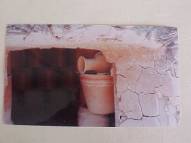Fabrica de Barros

Fabrica de Barros

During a visit to Ticul I had the opportunity to meet with David. He is a fifteen year old worker in a cottage industry that creates pottery for commercial use. David told me that he had been working in this particular business for two years. He said that he learned to do his job (putting pots in the kiln, "horno" for baking) by watching others, and then by doing the job himself. He also said that he was currently learning to do other jobs at the factory, including learning the art of making pots.
David said that most of the young people in Ticul learn the "family business," whatever that may be, as a trade. Many young people in Yucatecan pueblos become socialized into their parents' work world as soon as they are old enough to wander around a shop, or help with small tasks. David said that as children get old enough to work, they usually begin ¨training¨ for the trade that will most likely become their future career. As many of these young people continue a family business, the knowledge of technical terms, where to get materials, how to do the task and how to earn money from the trade is acquired through everyday family interaction, rather than through reading or formal training.
Maria Augusta Tzu, the mother of the current Jefa, explained that despite this, young workers do go through a "training process". This is an informal process where the younger workers spend time observing people in various tasks, such as mixing "sascab," a mixture of barro and stone dust; making the pots; preparing the wood and placing it in the oven for cooking the pots; firing the pots in the horno; and then mastering each task in a sequential order. She explained that reading about the tasks is not how they are learned, but rather the young workers experience the task.
David told me that he hopes to one day be a pot maker. At this time he is learning that trade, while working in the area of cooking the pots. David attends school, but spends many long hours working as well. This summer he is working 10 hours a day, six days a week. He makes the equivalent of $3.00 American dollars per day. For David, work is not a way to pass time after school or gain pocket change; rather it is a way to learn about how to make a living.
